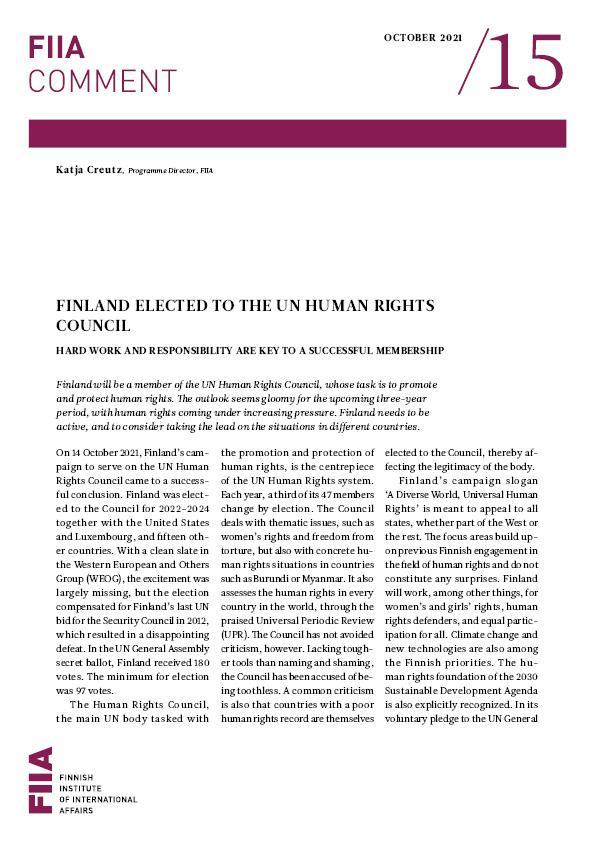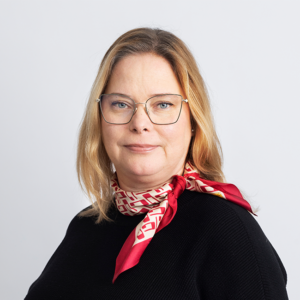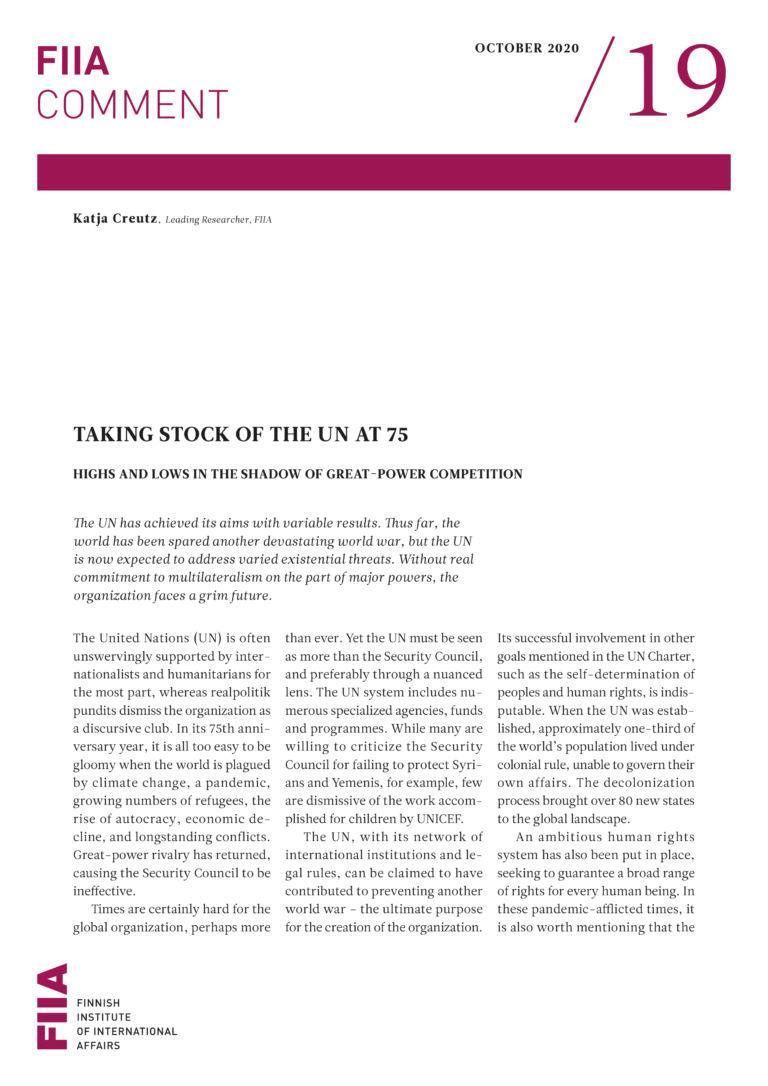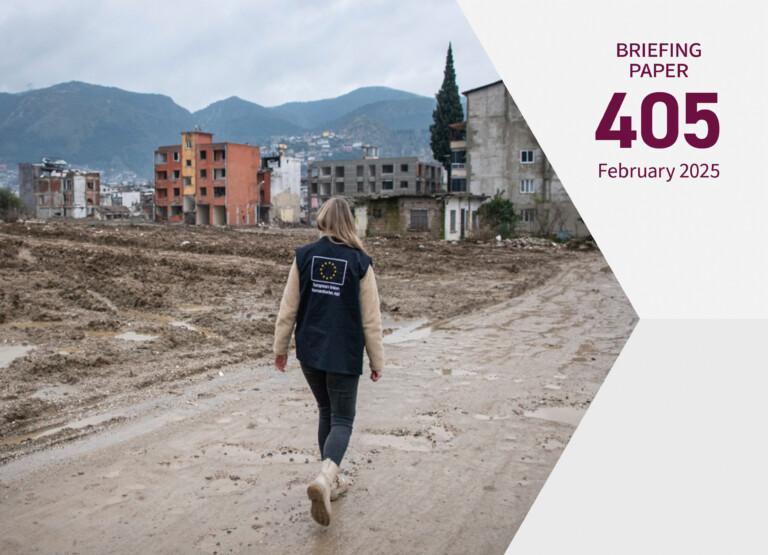
Finland will be a member of the UN Human Rights Council, whose task is to promote and protect human rights. The outlook seems gloomy for the upcoming three-year period, with human rights coming under increasing pressure. Finland needs to be active, and to consider taking the lead on the situations in different countries.
On 14 October 2021, Finland’s campaign to serve on the UN Human Rights Council came to a successful conclusion. Finland was elected to the Council for 2022–2024 together with the United States and Luxembourg, and fifteen other countries. With a clean slate in the Western European and Others Group (WEOG), the excitement was largely missing, but the election compensated for Finland’s last UN bid for the Security Council in 2012, which resulted in a disappointing defeat. In the UN General Assembly secret ballot, Finland received 180 votes. The minimum for election was 97 votes.
The Human Rights Council, the main UN body tasked with the promotion and protection of human rights, is the centrepiece of the UN Human Rights system. Each year, a third of its 47 members change by election. The Council deals with thematic issues, such as women’s rights and freedom from torture, but also with concrete human rights situations in countries such as Burundi or Myanmar. It also assesses the human rights in every country in the world, through the praised Universal Periodic Review (UPR). The Council has not avoided criticism, however. Lacking tougher tools than naming and shaming, the Council has been accused of being toothless. A common criticism is also that countries with a poor human rights record are themselves elected to the Council, thereby affecting the legitimacy of the body.
Finland’s campaign slogan ‘A Diverse World, Universal Human Rights’ is meant to appeal to all states, whether part of the West or the rest. The focus areas build upon previous Finnish engagement in the field of human rights and do not constitute any surprises. Finland will work, among other things, for women’s and girls’ rights, human rights defenders, and equal participation for all. Climate change and new technologies are also among the Finnish priorities. The human rights foundation of the 2030 Sustainable Development Agenda is also explicitly recognized. In its voluntary pledge to the UN General Assembly, Finland also promised to support the Council in its country-specific work. It is likewise notable that the campaign enjoyed broad political backing by Finnish foreign policy decision-makers.
There are several interconnected reasons for Finland’s decision to seek membership of the Council. Although one motivation is that Finland has never served a full three-year term before, the reasons for joining the Council are perhaps more principled than earlier. Being on the Council is central to the Finnish government’s decision to embark upon a human rights-based foreign policy in accordance with the 2020 Government Report on Finnish Foreign and Security Policy. The candidacy for and membership of the UN Human Rights Council constituted one of the more concrete policy goals in the realization of this more principle-based foreign policy. For Finland, it is also of utmost importance to support the rules-based international system and the functioning of its organs and bodies. More principled human rights voices are also needed at a time when human rights are being challenged.
Finland should not enter the Council with rose-coloured glasses, however. The coming years will not be easy with, among other things, both old and new country situations keeping the Council busy with the quest for accountability. Afghanistan represents a case in point with systematic and large-scale human rights violations emerging with respect to girls and women in particular. The Covid-19 pandemic has also caused a setback for human rights. Autocratic states, with China leading the way, pose a challenge to the existing UN system of human rights, criticizing, inter alia, the Council’s special procedures system with special rapporteurs and independent experts. These countries also attempt to undermine civil society participation in the UN human rights machinery. The global human rights landscape is on a downward spiral, and the world is also witnessing a setback in the progress made concerning the sustainable development agenda.
On a more positive note, the expectations regarding Nordic participation in the Council are on the rise. Iceland, serving recently on the Council, led country-specific work on the Philippines and the Kingdom of Saudi Arabia. Denmark, which is a member of the Council until the end of this year, also led a statement on Saudi Arabia, showing that the Nordics can build upon each other’s actions. While successful membership of the Council may require diplomatic courage, it also demands resources, liaison skills, good contacts between the Geneva mission and the capital, interaction with stakeholders, and preparedness to work hard for a full three-year term. There also needs to be political backing for the membership that spans national general elections. In this respect, the forthcoming parliamentary election in 2023 may come to affect Finland’s performance internationally.
Domestic actors, including civil society, the media, and researchers, should monitor the Finnish membership and, if needed, push for more concrete action. Although Finland may traditionally be inclined to conduct a non-confrontational foreign policy, the dire times call for responsible action on the international scene. Finland has already shown such resolve by leading a statement on human rights in Egypt during the Council’s March 2021 session. It is necessary to continue such work as situations involving wide or systematic human rights violations must be addressed. Although the Council may not be able to engage in swift action, it is able to act as an intermediary between present violations and future attempts to ensure accountability.







